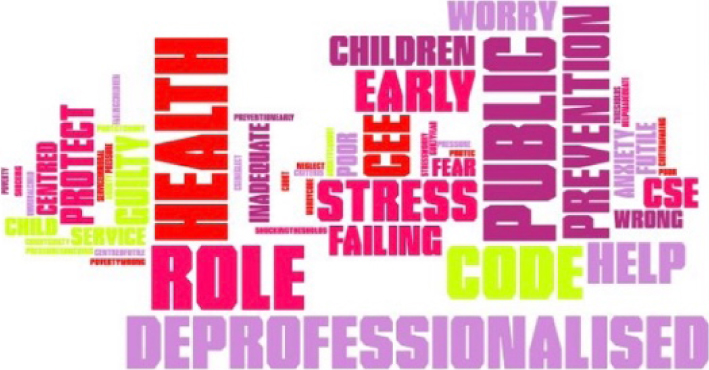‘You can't pour from an empty cup’ is a saying I was well accustomed to hearing as a child. A daughter of avid carers who devoted their lives to foster children and, indeed, anyone in need of a helping hand. However, they were very poor at doing this and, as a result, something I model. And something which the school nursing and wider nursing workforce isn't very good at either.
We, at SAPHNA (www.saphna.co), recently hosted a webinar providing a safe psychological space for our workforce to come together and discuss the relentless challenges and expectations brought to bear due to the exponential rise and multi-layered complexities in the safeguarding of children, young people, and their families. The resulting word cloud provides an accurate overview.
We had no magic solutions, rather, an acknowledgement and recognition of the exhaustion and helplessness being experienced; an openness to vent, share and learn and, the hope inspired by the unstinting and uplifting encouragement provided by Kenny Gibson, Deputy Director for NHS Safeguarding.
There is now huge demand for this to be offered on a regular basis, which we plan to do. This a simple yet effective step toward self-care.

During the pandemic we have, whether personally and/or professionally, experienced some degree of trauma; in school nursing we have also lost many cherished colleagues to COVID-19 and other illnesses. The fallout is now being acutely witnessed and across the whole children's workforce.
The move to reduced office/team-based working has, for many, stripped away the invaluable informal support and peer supervision it provides to say nothing of the debriefs to loud music on the drives in between safeguarding meetings/schools/homes and base!
‘During the pandemic we have, whether personally and/or professionally, experienced some degree of trauma; in school nursing we have also lost many cherished colleagues…’
This has, however, also been a positive catalyst to change with self-care and avoidance of staff burnout being placed high on the agenda by employers And, despite the pressures, they are actively encouraging staff to take time out resulting in staff taking proactive steps and, if required, seeking early help.
Initiatives such as NHSE listening lounges ‘Listening lounges and conversations with Jasper’ (NHS England, no date), ‘tea at 3’, monthly ‘self-care’ vouchers from employers, ‘walk and talk’ for staff (and separately for children), weekly yoga, dance, choirs (e.g. NHS Choir at https://funkyvoices.co.uk/the-choirs/nhs-choir) are just a few of the wonderful examples that have emerged during the pandemic.
Watson's Philosophy and Science of Caring is that caring science is the essence of nursing and the foundational disciplinary core of the profession. Watson's theory of human caring provides support for the engagement in self-care. She states:
‘We have to learn how to offer caring, love, forgiveness, compassion, and mercy to ourselves before we can offer authentic caring and love to others’ and we also must ‘treat ourselves with loving-kindness and equanimity, gentleness, and dignity before we can accept, respect, and care for others within a professional caring-healing model’
(Watson cited in Fawcett, 2018)
According to the World Health Organization (2018), self-care includes:
‘The ability of individuals, families, and communities to promote health, prevent disease, maintain health, and to cope with illness and disability with or without the support of a healthcare provider.’
Self-care is how we can promote our clients and, importantly, our own health, (physical, psychological, social, spiritual, and emotional). A useful framework on ways nurses can participate in self-care and detailing how ‘recharging’ can help improve patient care is provided in Bal (2022). Areas for self-care include:
- Physical self-care
- Mental self-care
- Social self-care
- Spiritual self-care
- Personal self-care.
There is a host of additional resources with helpful suggestions (e.g. Royal College of Nursing, 2020).
We know from the unusually high rates of sickness, recruitment and retention issues that our workforce is under immense strain; we also know that nurse burnout can affect the quality of care we can provide, leading to a lack of focus, forgetfulness, and mistakes due to exhaustion and, we know that our nursing and midwifery code of conduct demands and expects us to be able to ‘care with confidence’ (Nursing and Midwifery Council, 2018).
‘In the midst of the constantly evolving COVID-19 pandemic, it is vital that frontline clinicians have the support and essential resources they need to “reconnect with the purpose that drew them into health care so they can continue to experience, and offer, compassion”. Knowledge and competence are equally as important as kindness and compassion in frontline nurses and responders to the COVID-19 pandemic.’
(Hofmeyer et al, 2020 and Lown, 2018: 219 cited in Hofmeyer et al, 2020)
With all of this in mind then, we know we owe it to ourselves to self-care and refill that empty cup (note to self)!


